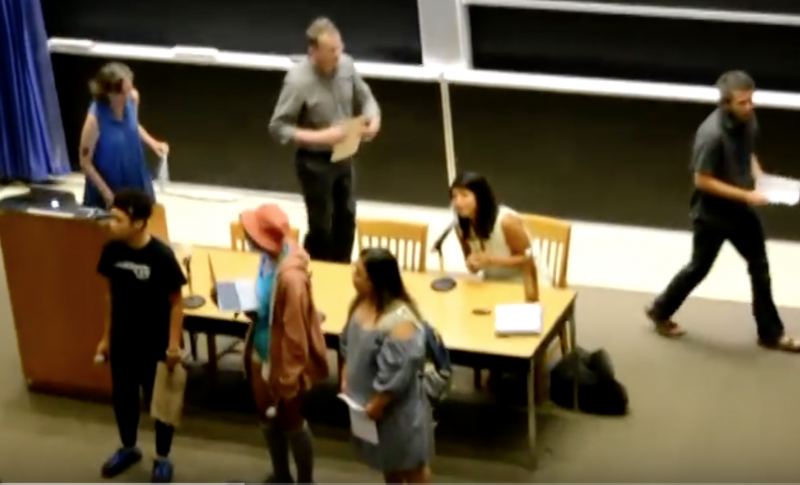An education from Reed College, where students’ sense of individualism is perhaps matched only by their studiousness, is anything but common. And recently one of Reed’s most distinctive experiences -- one designed, ironically, to bring students together -- has become one of its most divisive.
“We don’t ever want to repeat what happened that Wednesday -- we don’t ever want there to be shouting over one another and shouting people down,” said Kevin Myers, a Reed spokesperson, about escalating tensions over the college’s signature yearlong freshman humanities course.
He added, “I don’t think that was a proud moment, and we want to get past it.”
Debate on Hum 110
Three times a week, at 9 a.m., all of Reed’s 300-plus freshmen shuffle into a lecture hall for what’s known on campus as Hum 110. Starting with the Epic of Gilgamesh and ending with the Bible and Apuleius’ The Golden Ass, the required literary and historical survey of the ancient world is supposed to lay the foundation for students’ future studies in the humanities. Freshmen also get a taste of different teaching styles and disciplinary perspectives, as classes are taught by two dozen faculty members across fields. Those lectures are supplemented by smaller breakout sessions, called conferences.
Hum 110 -- like virtually everything at Reed -- is rigorous. But alumni who took the course as far back as 1943, when it was conceived, tend to recall it as one of their most worthwhile. Things changed last fall, though, when Reed, like so many other institutions, faced student demands that it be more inclusive of people of color.
Among activists’ sticking points, especially for a group of students called Reedies Against Racism, was Hum 110. The course, which faces a curricular and pedagogical review every 10 years but has maintained a fundamentally Western orientation, is simply too white, too male and too Eurocentric, critics charged, especially for a course required of all students. Moreover, the student activists said, Hum 110 largely ignores how these works may have been used over time to perpetuate violence against people of color.
Reed takes a dialogue-based approach to conflict resolution and engaged the students about their demands. Regarding Hum 110, Reed promised to begin reviewing the course one year earlier than planned; a faculty group got to work last year and professors' recommendations are expected later this fall. But in the interim, throughout last year, a group of 12 to 15 students has occupied the class -- surrounding the lecturing professor in silent protest -- for each session.
On many if not most campuses, a yearlong, in-class protest wouldn’t fly. But at Reed, despite varying levels of faculty comfort with lecturing through a protest, it did. The general understanding was that the protesters would be allowed to continue as long as they didn’t interfere in the lecture period.
Cut to Aug. 28, the first Hum 110 lecture of this year. Reedies Against Racism had announced in a widely circulated email that they planned to continue their protest this year. They also asked faculty members involved in the program for class time to introduce themselves -- a departure from the agreement about not interrupting teaching time. Hum 110 program leaders denied the request and, according to Reed, polled one another on what they wanted to do if the protesters attempted to disrupt the first lecture. They decided they’d cancel the class if need be.
“I’m sorry, this is a classroom space and this is not appropriate,” Elizabeth Drumm, Hum 110 program chair and the John and Elizabeth Yeon Professor of Spanish and Humanities, told a small group of protesters when they attempted to talk during class. Members of Reedies Against Racism continued, saying they had created a supplementary syllabus. The professors at the front of the room got up and left.

